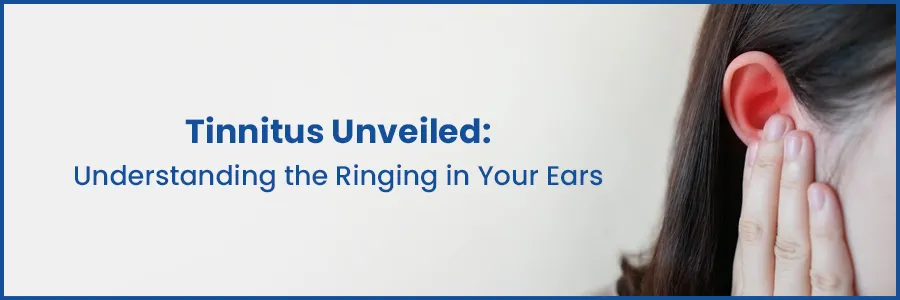Tinnitus Unveiled: Understanding the Ringing in Your Ears
Have you ever experienced a persistent ringing, buzzing, or humming sound in your ears that seems to have no external source? This baffling sensation is known as tinnitus, and it's more common than you might think.
Tinnitus encompasses a spectrum that spans from a slight inconvenience to a deeply troubling state, exerting its influence on your everyday existence and your holistic sense of wellness. In this article, we'll delve into the world of tinnitus, exploring its causes, effects, and the quest for effective treatments.
The Symphony of Sounds: Exploring Tinnitus
Imagine sitting in a serene environment, enjoying the stillness around you, when suddenly your ears begin to ring or buzz with a sound that nobody else can hear. This internal concert, often referred to as tinnitus, can manifest in various forms:
- Ringing in Ears: This is the most common type of tinnitus. It's characterized by hearing a ringing sound in one or both ears.
- Humming in Ears: Some individuals experience a low-frequency humming or buzzing sound in their ears, which can be both perplexing and frustrating.
- Pulsatile Tinnitus: In this form of tinnitus, you hear rhythmic beats or pulsing sounds that sync with your heartbeat. It's like having an internal drumbeat in your ears.
Causes of Tinnitus
Tinnitus doesn't stand alone as a distinct condition; instead, it emerges as a signal of an underlying matter that requires attention. The tinnitus causes can vary widely:
- Exposure to Loud Noise: Regular exposure to loud noises, such as concerts, construction sites, or even loud music through headphones, can damage the delicate hair cells in your inner ear, leading to tinnitus.
- Age-Related Factors: As we age, our hearing naturally deteriorates. This age-related hearing loss can bring tinnitus along with it.
- Earwax Buildup: An excess of earwax has the potential to obstruct the ear canal, disrupting the transmission of sound and giving rise to the phenomenon of tinnitus.
- Medical Conditions: Conditions like meniere's disease, which affects inner ear balance, and temporomandibular joint (TMJ) disorders, related to jaw alignment, can contribute to tinnitus.
- Medications and Substances: Certain medications, like high doses of aspirin, and even excessive caffeine or alcohol intake can trigger or worsen tinnitus.
Living with Tinnitus: The Impact
Tinnitus isn't just a fleeting annoyance; it can have a profound impact on your life:
- Sleep Disturbances: The persistent sounds can disrupt your sleep, leading to fatigue and reduced overall well-being.
- Concentration Challenges: Trying to focus on tasks or conversations can become challenging when your ears are constantly ringing or buzzing.
- Emotional Well-being: Tinnitus can cause stress, anxiety, and even depression, especially when its origins are unclear or when it severely impacts your daily life.
Tinnitus Treatment and Management
While there's no one-size-fits-all cure for tinnitus, various treatments and strategies can help manage its effects:
- Sound Therapy: Incorporating external auditory stimuli such as white noise devices, natural sounds, or calming melodies can serve to cloak or divert attention from the internal noises of tinnitus.
- Hearing Aids: In instances where tinnitus coincides with hearing loss, the utilization of hearing aids can enhance external auditory signals, thereby diminishing the prominence of internal sounds.
- Counseling and Therapy: Cognitive Behavioral Therapy (CBT) can help you develop coping strategies and change your emotional response to tinnitus.
- Lifestyle Adjustments: Protect your ears from loud noises, reduce caffeine and alcohol consumption, and practice stress-reduction techniques like yoga or meditation.
- Medical Interventions: In certain cases, medications might help manage tinnitus-related distress, although they might not eliminate the sounds themselves.
Seeking Solace in Silence
Tinnitus is a perplexing condition that affects millions worldwide. It can be challenging, but understanding its various forms, causes, and management techniques can help mitigate its impact on your life. If you or someone you know is dealing with tinnitus, remember you're not alone. Seeking professional guidance can provide valuable insights into managing this condition.


